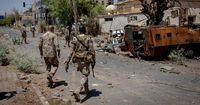On Monday, May 5, 2025, the United Nations’ top court, the International Court of Justice (ICJ), dismissed a case that accused the United Arab Emirates (UAE) of fueling genocide in Sudan by supporting paramilitary forces amid the ongoing civil war in the region. The court declared it "manifestly lacks jurisdiction" to hear the case, which was presented by the Sudanese government.
The ICJ's ruling was delivered by a 14-2 vote, which also included a narrower 9-7 decision to officially remove the case from its docket. While the court did not rule on the allegations made by Sudan, it emphasized its inability to intervene due to the UAE's prior reservation when it signed the 1948 Genocide Convention in 2005. This reservation explicitly stated that the UAE would not allow disputes regarding the convention's interpretation or application to be resolved at the ICJ.
In March of this year, Sudan had urged the court to take up its case, claiming that the UAE had violated the Genocide Convention by arming and funding the Rapid Support Forces (RSF), a powerful paramilitary group currently at odds with the Sudanese military. During the initial hearing last month, Sudan called for the court to impose emergency measures requiring the UAE to cease actions that could lead to genocide against the Masalit people in Darfur, as well as to halt any further assistance to the RSF.
In response, the Emirati government firmly rejected Sudan's claims, arguing that the Sudanese had failed to provide credible evidence to support their allegations. Reem Ketait, a senior official at the Emirati foreign ministry, stated, "Quite simply, today’s decision represents a resounding rejection of the Sudanese Armed Forces’ attempt to instrumentalize the Court for its campaign of misinformation and to distract from its own responsibility."
Despite the court's dismissal, it expressed concern over the humanitarian crisis unfolding in Sudan, noting that it was "deeply concerned about the unfolding human tragedy in Sudan." The ongoing conflict, which began in April 2023, has resulted in widespread hunger, famine, and the displacement of nearly 13 million people, alongside tens of thousands of deaths.
The RSF has its roots in the notorious Janjaweed militias, which gained infamy for their brutal actions during the Darfur conflict in the early 2000s. That conflict led to the International Criminal Court indicting Sudan's former dictator, Omar Hassan al-Bashir, on charges of genocide and crimes against humanity in 2009. Although al-Bashir was overthrown in 2019, he has yet to be handed over for prosecution.
As the civil war escalated, the UAE reportedly engaged in covert operations to support the RSF, supplying them with weapons and drones, treating injured fighters, and airlifting the most severely injured to its military hospitals. A recent report by Emirati state media claimed that authorities foiled an attempt by Sudanese military officials to smuggle weapons to the Sudanese army through an airport in the UAE.
The RSF has been accused of committing ethnic cleansing and acts of genocide against the non-Arab Masalit ethnic group, while the Sudanese military has been accused of using chemical weapons and indiscriminately targeting civilians. The conflict has intensified in recent weeks, with the military consolidating control over the capital, Khartoum, and the RSF solidifying its grip on Darfur. Just last week, the RSF reportedly killed more than 100 civilians in an attack on the southern city of Nahud and looted local markets and pharmacies.
In light of the ICJ's decision, some legal experts have voiced concerns over the implications of the UAE's blanket reservation to the Genocide Convention. A group of prestigious international jurists recently supported a legal opinion from the Raoul Wallenberg Centre for Human Rights, arguing that such reservations should be deemed invalid. They contend that allowing states to exempt themselves from the convention's judicial mechanisms undermines the integrity and efficacy of international law.
The ICJ's ruling marks a significant diplomatic victory for the UAE, which has faced repeated allegations of prolonging the bloody civil war by arming the RSF. However, a UN panel of experts reported on April 29, 2025, that it found no evidence to substantiate claims that the UAE was supplying arms to the RSF.
As the conflict rages on, the international community continues to grapple with the dire humanitarian situation in Sudan. With 153 states currently party to the Genocide Convention, the UAE remains one of 16 states that have inserted blanket reservations, a move that has drawn criticism from influential nations like the UK.
In the wake of the ICJ's decision, Reem Ketait emphasized the need for the international community to focus on ending the devastating conflict and ensuring humanitarian aid reaches those in need. She stated, "The Sudanese Armed Forces and the Rapid Support Forces must stop fighting, must stop weaponizing aid, and must endorse civilian leadership independent from military control as the only foundation for sustainable peace."
As the world watches the unfolding tragedy in Sudan, the complexities of international law and the responsibilities of states under the Genocide Convention remain a contentious topic. The ICJ's ruling underscores the challenges that arise when states seek to evade accountability, leaving the door open for continued violence and suffering in the region.

